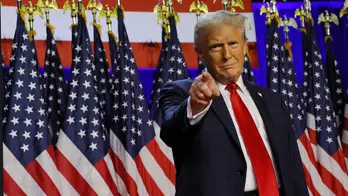Germany’s Scholz rejects calls for no-confidence vote as coalition government collapses
German Chancellor Olaf Scholz on Thursday rejected calls for a no-confidence vote after he fired his finance minister in a signal that his coalition government was collapsing, saying he will lead the country with a minority government until early next year.
Demands for immediate elections were issued by the leader of the largest opposition bloc in parliament, Friedrich Merz of the center-right Christian Democrats, after Scholz fired Finance Minister Christian Lindner on Wednesday for proving uncooperative in his attempts to repair the economy.
"The finance minister shows no willingness to implement the offer for the good of our country. I do not want to subject our country to such behavior anymore," Scholz said according to an NPR report.

German Chancellor Olaf Scholz, center, leaves the Bellevue Palace in Berlin, Germany, Thursday, Nov. 7, 2024. (AP Photo/Ebrahim Noroozi)
GERMAN CHANCELLOR SCHOLZ WARNS NEXT EUROPEAN COMMISSION PRESIDENT AGAINST COURTING FAR-RIGHT SUPPORT
The move paved the way for Germany’s parliament to issue a confidence vote on Jan. 15, which is expected to lead to elections by March rather than the September timeline elections were previously set to be held . But some are calling for the proceedings to take place in 2024.
"The coalition no longer has a majority in the German Bundestag, and we therefore call on the chancellor . . . to call a vote of confidence immediately, or at the latest by the beginning of next week," Merz said.
Scholz on Thursday stressed that he will not take steps to push the vote of confidence up any sooner than January.
"The citizens will soon have the opportunity to decide anew how to proceed," the chancellor said according to a report by AP that cited the German Press Agency (DPA). "That is their right. I will therefore put the vote of confidence to the Bundestag at the beginning of next year."
The finance minister was accused by Scholz of breaching his trust after Lindner publicly called for a plan that would create tax cuts worth billions for a few top earners while at the same time cutting pensions for all retirees.
"That is not decent," Scholz said.

German opposition leader and Christian Union parties floor leader Friedrich Merz arrives for a meeting with German Chancellor Olaf Scholz at the chancellery in Berlin, Thursday, Nov.7, 2024. (AP Photo/Markus Schreiber)
FEDERAL MILITARY DRAFT AGENCY REPOSTS MESSAGE SUGGESTING US IS BECOMING 1936 NAZI GERMANY: REPORT
The economic policy disagreements reportedly arose as the coalition government – which has been in power since 2021, when Angela Markel left office – looks to plug a billion-euro hole in Germany’s 2025 budget.
Scholz is reportedly hoping that he will be able to work with his coalition government – encompassing his left-leaning Social Democrats party as well as the environmentalist Greens party – in conjunction with members of Merz’s center-right party to pass legislation in the coming weeks to address their 2025 budget gaps.
"We simply cannot afford to have a government without a majority in Germany for several months now, and then campaign for several more months, and then possibly conduct coalition negotiations for several weeks," Merz said in objection to Scholz’s plan.

German Chancellor Angela Merkel attends a ceremony to receive the Buber-Rosenzweig medal at the Chancellery on August 30, 2021 in Berlin, Germany. (Photo by Andreas Gora - Pool/Getty Images))
CLICK HERE TO GET THE FOX NEWS APP
Given that Scholz’s party no longer holds the majority, he is expected to lose in the upcoming confidence vote, at which point Germany’s president could dissolve parliament within 21 days and force an early election as soon as January.
"During these 21 days, we will have enough time to find out whether there are any issues that we may have to decide on together," Merz said before pledging to work cooperatively with the minority government. "We are, of course, prepared to hold talks . . . we are also prepared to take responsibility for our country."
The Associated Press contributed to this report.
Disclaimer: The copyright of this article belongs to the original author. Reposting this article is solely for the purpose of information dissemination and does not constitute any investment advice. If there is any infringement, please contact us immediately. We will make corrections or deletions as necessary. Thank you.







